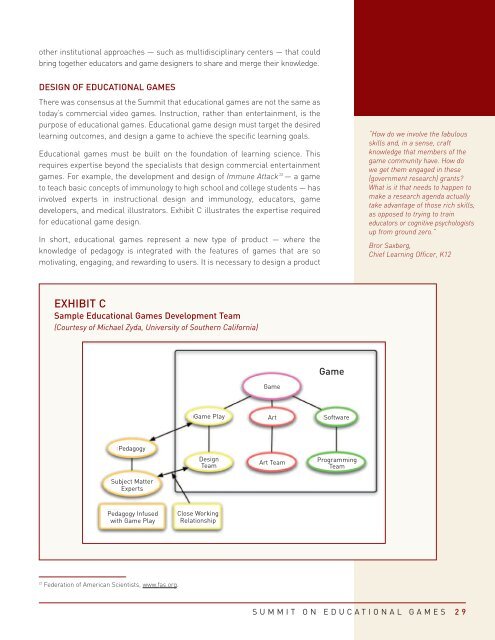Summit on Educational Games - Federation of American Scientists
Summit on Educational Games - Federation of American Scientists
Summit on Educational Games - Federation of American Scientists
You also want an ePaper? Increase the reach of your titles
YUMPU automatically turns print PDFs into web optimized ePapers that Google loves.
other instituti<strong>on</strong>al approaches — such as multidisciplinary centers — that could<br />
bring together educators and game designers to share and merge their knowledge.<br />
DESIGN OF EDUCATIONAL GAMES<br />
There was c<strong>on</strong>sensus at the <str<strong>on</strong>g>Summit</str<strong>on</strong>g> that educati<strong>on</strong>al games are not the same as<br />
today’s commercial video games. Instructi<strong>on</strong>, rather than entertainment, is the<br />
purpose <strong>of</strong> educati<strong>on</strong>al games. Educati<strong>on</strong>al game design must target the desired<br />
learning outcomes, and design a game to achieve the specific learning goals.<br />
Educati<strong>on</strong>al games must be built <strong>on</strong> the foundati<strong>on</strong> <strong>of</strong> learning science. This<br />
requires expertise bey<strong>on</strong>d the specialists that design commercial entertainment<br />
games. For example, the development and design <strong>of</strong> Immune Attack 22 — a game<br />
to teach basic c<strong>on</strong>cepts <strong>of</strong> immunology to high school and college students — has<br />
involved experts in instructi<strong>on</strong>al design and immunology, educators, game<br />
developers, and medical illustrators. Exhibit C illustrates the expertise required<br />
for educati<strong>on</strong>al game design.<br />
In short, educati<strong>on</strong>al games represent a new type <strong>of</strong> product — where the<br />
knowledge <strong>of</strong> pedagogy is integrated with the features <strong>of</strong> games that are so<br />
motivating, engaging, and rewarding to users. It is necessary to design a product<br />
EXHIBIT C<br />
Sample Educati<strong>on</strong>al <strong>Games</strong> Development Team<br />
(Courtesy <strong>of</strong> Michael Zyda, University <strong>of</strong> Southern California)<br />
Pedagogy<br />
Subject Matter<br />
Experts<br />
Pedagogy Infused<br />
with Game Play<br />
22 Federati<strong>on</strong> <strong>of</strong> <strong>American</strong> <strong>Scientists</strong>, www.fas.org.<br />
Game Play<br />
Design<br />
Team<br />
Close Working<br />
Relati<strong>on</strong>ship<br />
Game<br />
Art<br />
Art Team<br />
Game<br />
S<strong>of</strong>tware<br />
Programming<br />
Team<br />
“How do we involve the fabulous<br />
skills and, in a sense, craft<br />
knowledge that members <strong>of</strong> the<br />
game community have. How do<br />
we get them engaged in these<br />
(government research) grants?<br />
What is it that needs to happen to<br />
make a research agenda actually<br />
take advantage <strong>of</strong> those rich skills,<br />
as opposed to trying to train<br />
educators or cognitive psychologists<br />
up from ground zero.”<br />
Bror Saxberg,<br />
Chief Learning Officer, K12<br />
SUMMIT ON EDUCATIONAL GAMES 29
















